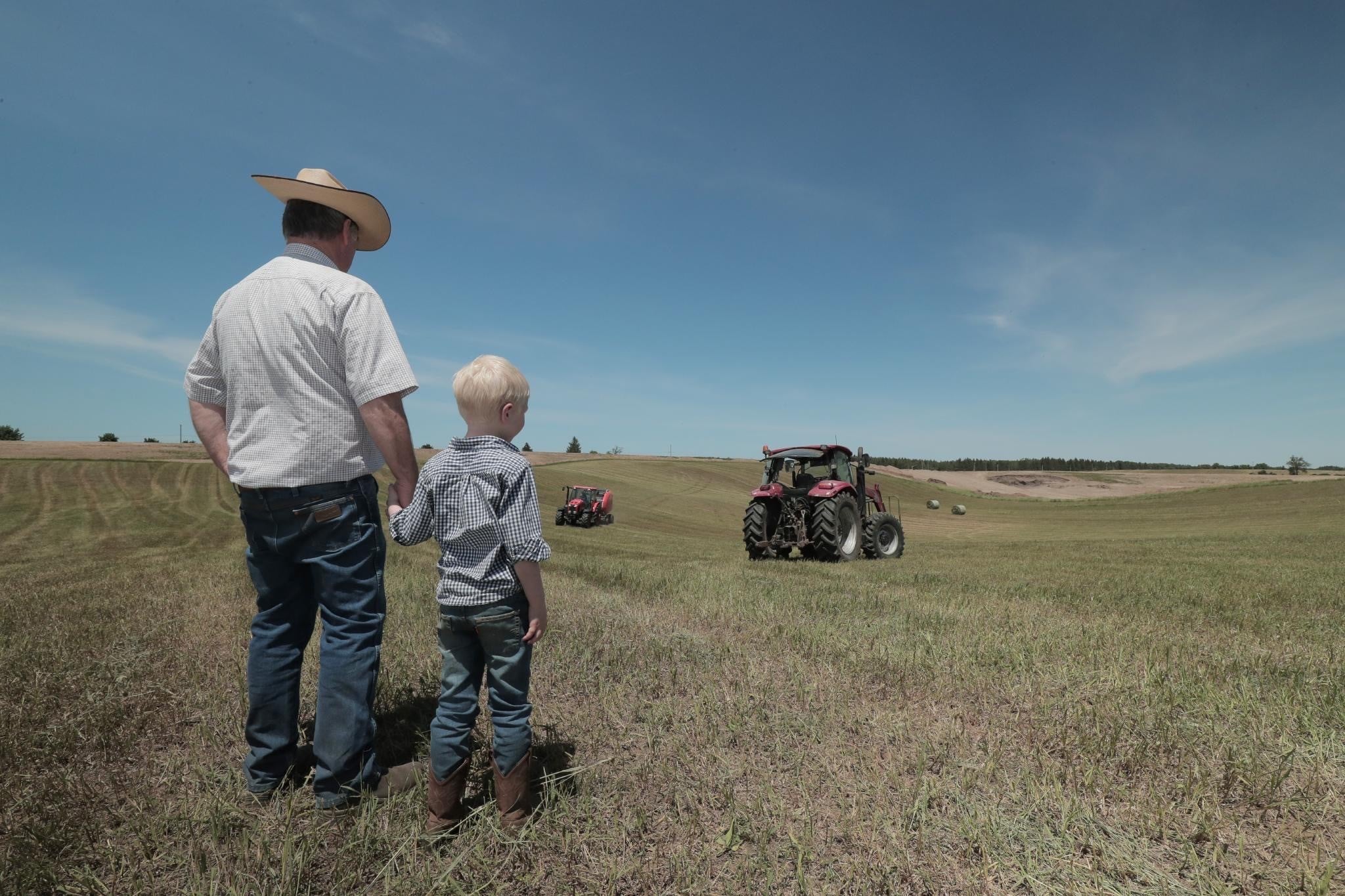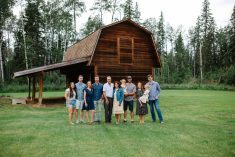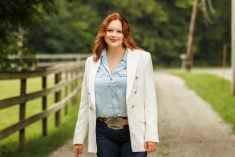We begin with a happy story. It was 3 a.m. and 18-year-old Ryan Galbraith was sitting in a seeder in a field in the middle of Western Australia when he realized all he wanted was to be a farmer.
“It was one of those moments — you’re just out there enjoying it, you’re tired but you have a smile,” he says.
Galbraith’s roots were in farming. His parents Neil and Roberta are fifth-generation family farmers who had launched their own grain operation north of Minnedosa, Man., with little financial help in 1989, slowly building to the point where they could farm full-time in 2007.
Read Also

Where convention and innovation meet
How one Ontario farm is integrating technology into their beef operation.
Now, their son had his whole future in front of him. He had freshly graduated from high school and was almost sure he wanted to join them. But first he’d jumped at the opportunity to fly across the globe and work on a large Australian grain farm. After seeding, he came home, worked a couple of summer jobs, and later that year, returned to Australia for fall combining.
Galbraith says the Australian family was passionate about what they did, which made him see how his parents had that same passion too.
“When I came home from the second trip, I convinced my parents that (the family farm) was where I needed to be, and the rest was history,” he says. He enrolled in the ag diploma course at the University of Manitoba, and at the same time rented some land from his parents and started small.
Since then, Galbraith and his parents have built their partnership to the point where they co-manage the farm.
“The last couple of years, I’ve taken over day-to-day management and a few other aspects of the farm, and I’ve just recently taken over a lot more of the responsibilities,” he says. “It was an interesting transition for a while there. My dad wasn’t full-time farming for very long, so it was tough for him to transition parts of the business. He was still having fun.”
These days, the senior Galbraiths handle agronomy and high-level marketing, but are stepping back a bit to enjoy retirement, says Galbraith. His younger brother Jason also joined the operation a few years ago, which Galbraith says has been a boon for the farm.
Amid transition, all four are learning how to move forward and “keep everyone happy with how things are shaking out,” says Galbraith. It’s not always easy.
Perhaps that “it’s not always easy” is an understatement, though — sometimes things are very difficult.
“I think my parents are finding it very difficult to hand over the business they’ve built from the ground up. It’s like another kid to them,” he says. “It would be like that for me. It’s hard for them to step back, but they don’t want to be forging ahead, so they understand both sides.”
As he stands back, he says, “I’m very impressed with how they have come along with the succession and deciding what their roles should be. Now it’s the hard part of making it happen.”
Are you ready?
A lot of speeches have been given and even more words have been written trying to convince senior farmers to start succession planning with the next generation.
Fewer young farmers are the ones who actually initiate the discussions as potential successors, but as Ryan Galbraith’s example shows, this can work too.
But what if you’re a young farmer and your parents aren’t willing to help you move the needle?

As a performance coach and the founder of LeaderShift, Kelly Dobson gets asked if he provides transition services. His shrewd response is, “I’ll say, ‘No, but I’ll help you show up in that situation at your best!” he says.
Dobson says he’s had many conversations with farm advisers about the challenges of trying to provide advice on succession planning where there’s family resistance.
His message starts with a crucial change of perspective. “What I’ve been trying to remind them is that what surfaces as farm management challenges are signs and symptoms of a leader effectiveness challenge.”
Dobson says if he were approached by a young farmer encountering succession resistance from his or her parents, he would ask three things. First, he’d ask what the wannabe farmer would want to learn if they had an open conversation with their parents. Second, what they would want the parents to hear.
“Lastly,” asks Dobson, “Do you have the appropriate level of trust established (with your parents) for you to say what you want to say, and ask what you want to ask?”
Dobson knows he’s probing into an intimate and personal area, but expects an answer — by which he means a real answer that is thought out and expressed in words and sentences.
He’s seen time and time again that most people cannot put into words why they feel uncomfortable having those initial succession conversations.
“One part I’m seeing is that the parents have no way to communicate to the child that they simply don’t trust them. They don’t know how to say they (the next generation) are not ready. All they know is that when this comes up, they are experiencing a physiological sensation — anger, frustration, shame, worry, sadness — and they don’t know what it is, but it’s an uneasiness they can’t put into words. They can’t say it in a way that will maintain their relationship with their child on the farm.”
Advisers do see extremes in succession. Sometimes parents want to put off the conversation as long as possible, even if the younger farmer is demonstrably ready to begin the succession process. Sometimes the younger generation wants to fast-track succession and take over the farm tomorrow, which Dobson says is exactly what parents are afraid of.
The best-case scenario is when younger farmers are willing to slowly build trust with the senior generation and both sides are willing to talk honestly.
“On the younger farmers’ side, what I encourage is to have them express what they want, and understand that they need to be looking for ways to demonstrate interest and readiness to do all of it, not just some of it,” says Dobson.
And he tells parents that when the next generation expresses an interest in farming, it’s a starting point. “Parents need to be able to trust their life’s work into the next generation’s hands. That needs to be built.”
Put a structure around it
Dobson points to author and business consultant Robert Fritz’s idea that the structure determines performance. Too many of us, he says, focus on individual situations as they come up. But structure can be enormously helpful in farm transition discussions.
“Putting a structure around something like farm transition, what that looks like — most people don’t talk about a progression of levels of responsibility, to build levels of partnership and trust,” Dobson says. “But if we don’t have the basic day-to-day system of engagement and a process, it can run into trouble very quickly.”
Dobson makes another point. An individual’s capacity for integrity and courage can be measured in part by their willingness to speak up even when it’s uncomfortable and risky. Indeed, over time this capacity for tough conversations can grow.
Building trust – and patience
Colin and Lori Penner farm near Elm Creek, Man., with Colin’s parents Cal and Gloria, and Colin’s younger brother Scott and his wife Andrea.
When Penner was in his early 20s, he knew he wanted to farm full-time. He initiated the first succession conversations in his family, but they didn’t go exactly as he hoped.
“I wanted to get it rolling,” he says. “I pushed my parents to get on with sorting it out. But they said, ‘You need to get a university education first.’” Penner got an agriculture diploma at the University of Manitoba, but when he raised the topic of farming full-time again, his father told him now he needed some work experience off the farm.
Part of this was a problem of scale: there wasn’t enough for him to do on the farm yet. But mostly, his father knew the farm would be stronger for the experience Penner gained in other areas.
So he got a job working for a grain company. He started by working in the chem shed and doing some agronomy, and later worked buying grain and selling chemicals on the road. He left the grain company in 2014, and six years ago began teaching extension courses at the University of Manitoba.
Looking back, Penner sees the experience he gained off-farm had big payoffs for the operation. But it didn’t feel that way back then.
“It was terribly frustrating at the time, but looking back on it now it’s probably one of the best things I did. As a 25-year old, you’re ready to go and work and work and you want to just make things happen now. So learning a bit of patience was tough.”
Penner says when he first raised the topic of succession, he was trying to have a conversation his parents weren’t yet ready to have. “I probably wasn’t ready at the time either. Looking back at who I am now and who I was — the person who initiated those conversations wasn’t ready to be a farm manager.”
Since he began farming full-time in 2014, the farm has doubled in size. Penner and his father each farm equal portions of the farm, and Scott and Andrea farm a smaller piece. Colin and Lori have a concurrent succession plan with Lori’s parents. The goal is to get to the place where the younger families are farming together, with a clear structure for dividing the operations down the road if subsequent generations want to take things in different directions.
For now, Penner and his father are enjoying the time farming together. “It’s an awful lot of fun farming with my dad right now,” he says. “I’m not ready for the day he’s ready to leave.”
His advice to other young farmers trying to start a succession conversation is “Be patient. Sometimes as the upcoming generation, you’re not ready yet. The parents are being gentle or polite with you by not having the conversation.”
At the same time, “Be persistent. Things do need to be discussed. It’s one of those things where it’s really easy to just say, ‘It’s going to happen some day.’ Communication is a very key part … communication with goals and goals that are tangible, so that you can say, ‘Yes, we achieved this.’ It’s great and easy to talk about it but things need to get done.”
Communication is key for Galbraith too. “As soon as communication stops, you might as well just fold it all up,” he says. “As long as you keep the communication lines open, nothing is outside the realm of possibility.”
But there’s more the next generation can do too, Dobson says. Often, in fact, it comes down to baby steps.
“(At LeaderShift) we talk about how most people want an outcome, they want to leap to the end. But what is the first step you can take immediately and do that in the next 24 hours to move (succession) forward? It could be something as simple as demonstrating you can take responsibility, asking questions, getting education, showing up to work on time.”
Sometimes the younger generation can shift things along, he says, simply by being model employees, demonstrating they can handle challenges and responsibilities, point out potential problems, and pose solutions.
Galbraith says he’s learned that being vulnerable can be incredibly powerful in tough talks — not just with his parents, but with his farming peers. “When you let down your guard, everybody else tends to do it as well and it really opens up the conversation.”
He says he and his dad work very well together, despite their differences.
“When we do have disagreements, and there are a fair few, you go away and do your thing and come back and work through it and then continue on. We’re both pretty stubborn but we’re stubborn enough that we won’t not talk about it in the end.”
















